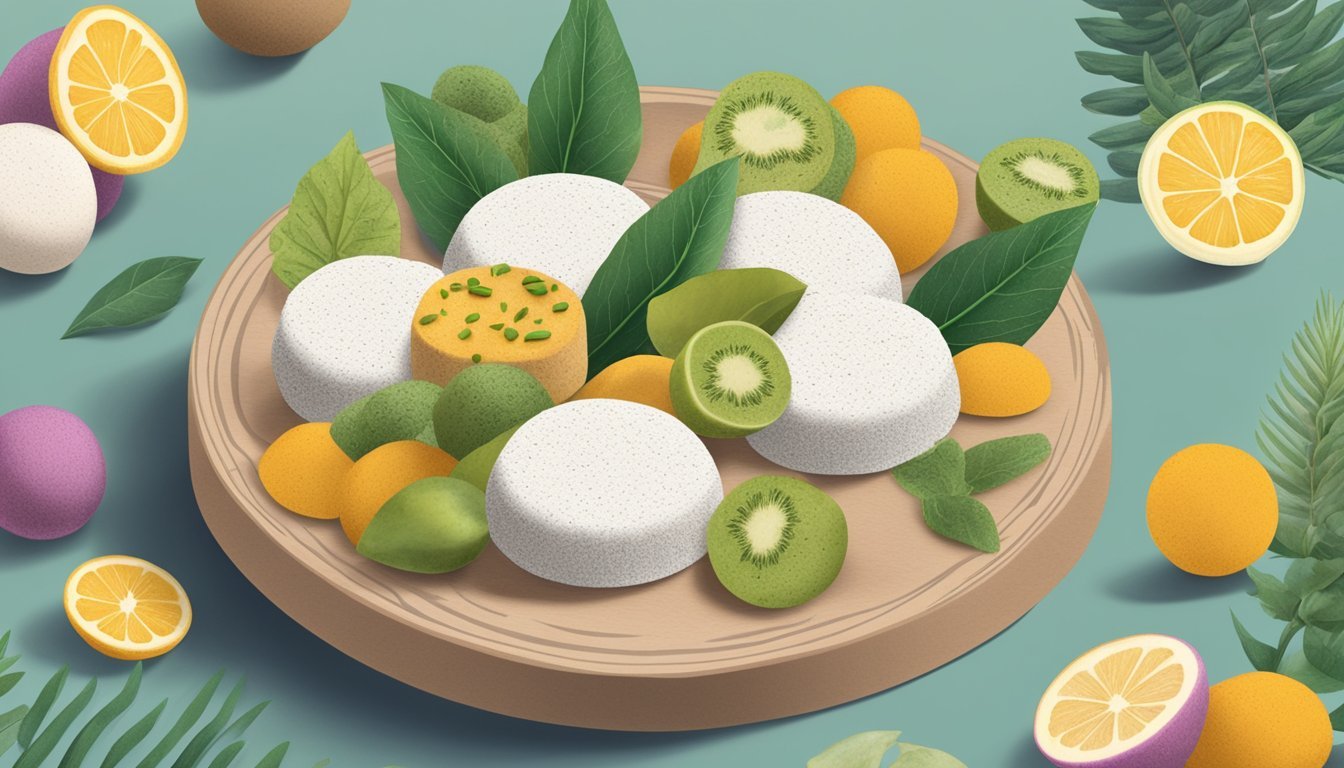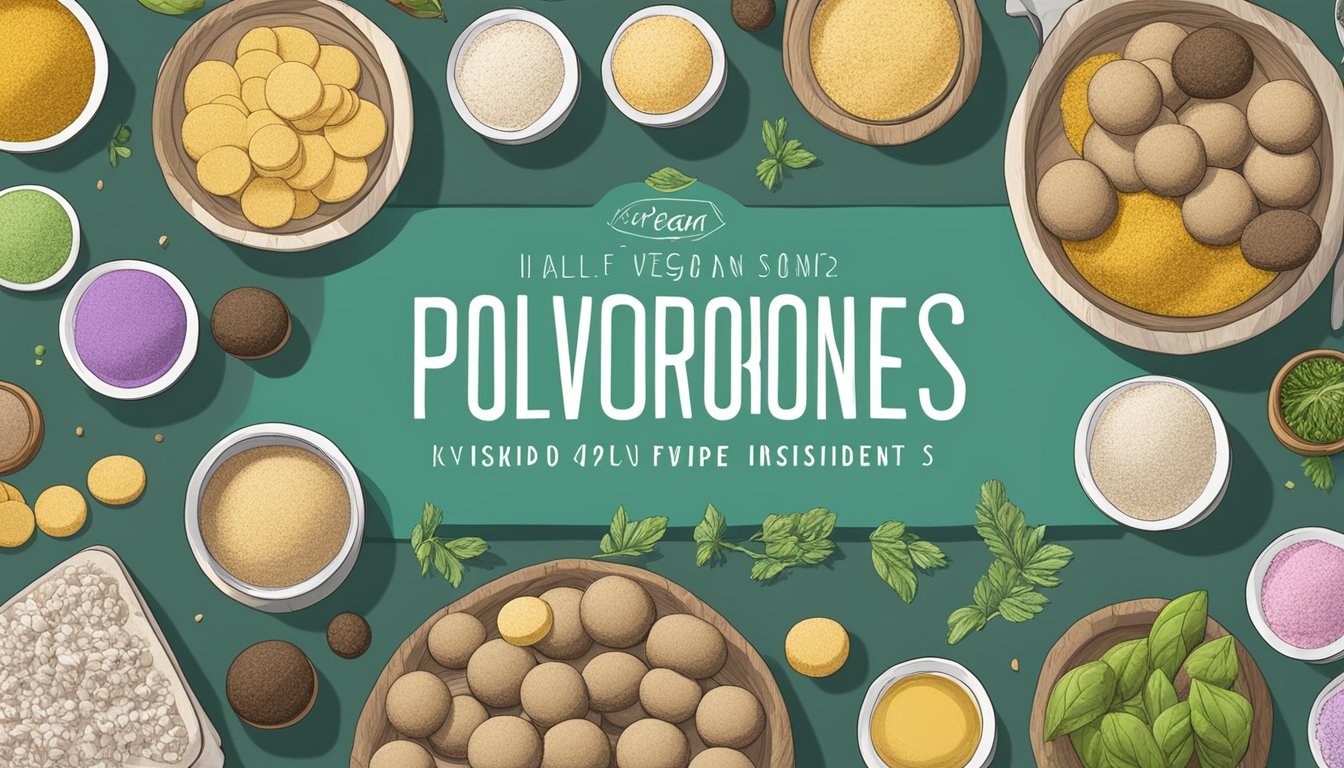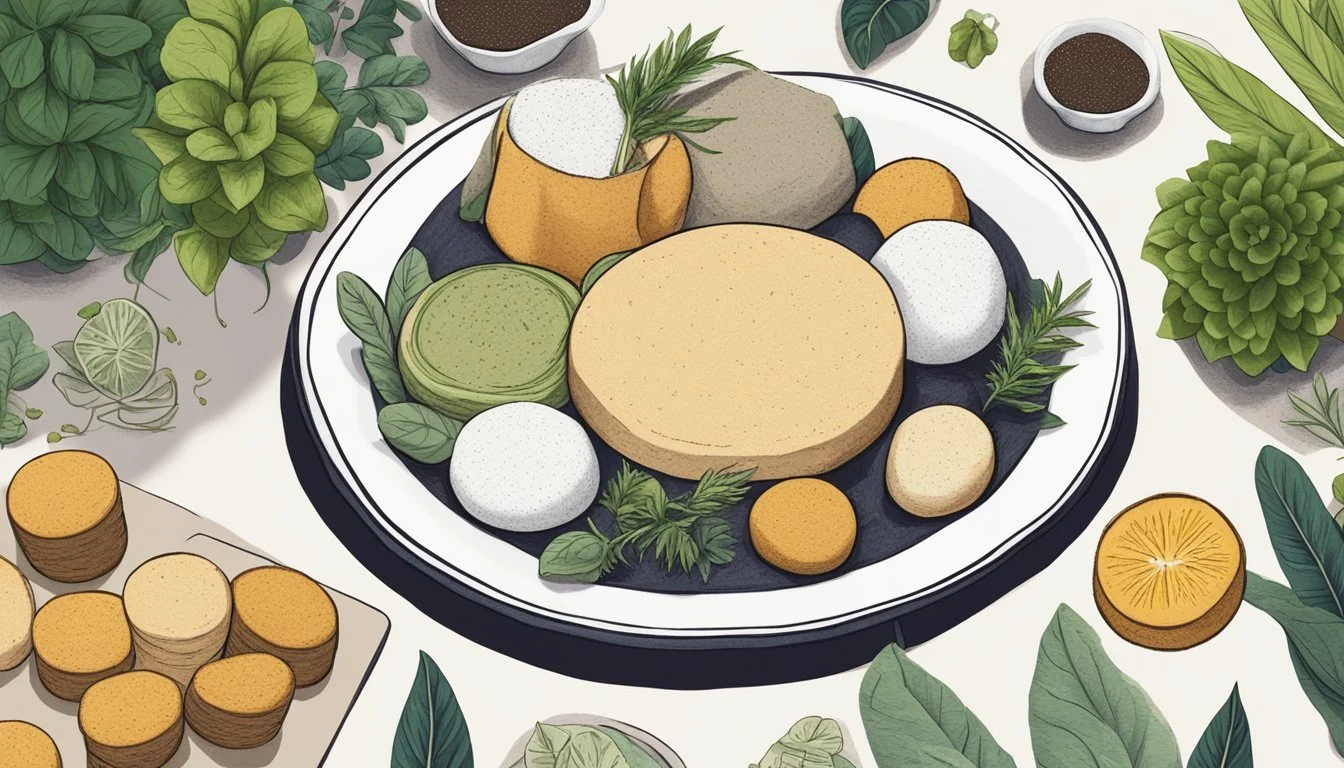Are Polvorones Vegan?
Unveiling the Ingredients of This Traditional Treat
Polvorones, often known as Mexican wedding cookies or Spanish shortbreads, are traditional treats that have been savored for generations. Typically, these crumbly cookies are made with ingredients like flour, sugar, butter, and nuts—a combination that is not inherently vegan due to the use of dairy butter. The rich, tender texture of polvorones comes from this classic blend, which particularly appeals to those with a sweet tooth.
However, vegan adaptations of polvorones retain the indulgent qualities of the original recipe while aligning with plant-based dietary preferences. Vegan bakers substitute dairy butter with plant-derived options such as vegan butter or extra virgin olive oil. This allows for a final product that upholds the delightful characteristics of traditional polvorones without the use of animal-derived ingredients. With growing interest in vegan lifestyles, vegan polvorones offer a way for more people to enjoy this beloved cookie while adhering to their dietary choices.
Recipes for vegan polvorones often incorporate alternative flavors such as anise, orange zest, and even horchata-inspired variations. The vegan versions ensure inclusivity at celebrations and broaden the reach of these baked goods. Whether for ethical, health, or environmental reasons, vegan polvorones cater to a wider audience, proving that traditional recipes can successfully be revisited to match modern dietary practices.
Understanding Polvorones
Polvorones are a type of shortbread cookie known for their rich flavor and crumbly texture. They are associated with celebrations, especially Christmas in Spain and weddings in Mexico.
History and Origin
The history of polvorones can be traced back to Spain in the 16th century. The town of Estepa in the province of Seville is recognized as the birthplace of these cookies. Originally, polvorones were part of Christmas celebrations and were made using locally sourced lard from Iberian pigs, which contributed to their distinct crumbly texture.
Traditional Ingredients
Traditional polvorones consist of a simple yet indulgent recipe. Key ingredients include:
Flour: Often toasted to develop a nutty flavor.
Sugar: For sweetness.
Butter or Lard: The fat component that gives the cookies their tender crumble.
Cinnamon and Almonds: Commonly used for flavoring.
Occasionally, ingredients like lemon zest, anise, or vanilla are added for different variations.
Common Variations
Polvorones have evolved into numerous variations across different cultures:
In Spain, they maintain their traditional recipe closely.
Mexican cuisine has adapted them into Mexican wedding cookies.
Similar cookies known as Russian tea cakes exist in different cultures, often featuring pecans or almonds.
Some modern recipes include chocolate, pecans, or almond flour to cater to various taste preferences.
However, polvorones are generally non-vegan due to the use of animal fat, but vegan versions substitute butter and lard with plant-based fats.
Vegan Dietary Principles
In the pursuit of a vegan lifestyle, understanding what constitutes vegan dietary principles is crucial. These guidelines ensure that a diet is free from animal-derived ingredients, aligning with the ethical and health considerations of veganism.
Defining Veganism
Veganism is a dietary choice and lifestyle that excludes all animal products and by-products. Those who adopt veganism typically do so for various reasons, including animal welfare, environmental concerns, and health benefits. A core principle of a vegan diet is the avoidance of meat, dairy, eggs, and honey, as well as any other items that may directly or indirectly contribute to animal exploitation.
Non-Vegan Ingredients to Avoid
When transitioning to a vegan diet, there are specific non-vegan ingredients to be mindful of. These include:
Butter: A dairy product often used in baking and cooking, commonly replaced by plant-based alternatives such as Earth Balance.
Lard: Rendered pork fat used in many traditional pastry recipes, including some versions of polvorones.
Eggs: Used as a binding agent in baking, replaceable with flax or chia seeds mixed with water, banana, or commercial egg replacers.
Milk: A staple in many diets, but in veganism, it is substituted with plant milks made from almonds, soy, oats, or coconut.
To maintain vegan dietary principles, individuals must read labels and be aware of less obvious non-vegan ingredients such as casein, whey, and gelatin. This careful inspection of ingredients ensures support for a diet that respects animal life and contributes to a more sustainable relationship with the earth.
Vegan-Friendly Ingredients
When crafting vegan polvorones, it's essential to consider the origin of each ingredient. Vegan recipes eliminate all animal-derived elements, focusing on plant-based alternatives that achieve similar flavors and textures.
Plant-Based Fats
The traditional recipe for polvorones often calls for butter, but several vegan alternatives are available to replicate the richness and creaminess:
Vegan Butter: A mixture of plant oils crafted to mimic the taste and functionality of traditional butter.
Coconut Oil: Provides a unique flavor profile and solid-state at room temperature, similar to the consistency of butter.
Olive Oil: An option that offers a healthier fat profile and a distinct taste.
Alternatives to Sugar and Flavorings
Vegan recipes sometimes require specific types of sweeteners and flavorings which must not be processed using animal-derived products:
Cane Sugar: Ensure it's unrefined to be certain it's vegan, as the refinement process for sugar often involves animal products.
Vanilla Extract: A common flavoring in polvorones, it's easy to find vegan versions of vanilla extract.
Flour Options
Flour serves as the main structural component of polvorones, and various vegan-friendly flours can be used based on desired flavor and nutritional content:
All-Purpose Flour: The most commonly used base for cookies, including polvorones.
Almond Flour: Adds a nutty flavor and is rich in nutrients.
Whole Wheat Flour: Offers a denser texture and more fiber.
Gluten-Free Flour: A mixture of gluten-free flours like rice flour can accommodate those with gluten sensitivities, as noted in the Astig Vegan polvoron recipe.
Making Vegan Polvorones
Crafting vegan polvorones requires precise steps and a set of basic kitchen tools. Adhering to these guidelines ensures a delightful balance between a sweet flavor and a satisfyingly crumbly texture.
Essential Kitchen Tools
To prepare vegan polvorones, one will need:
An electric mixer or a food processor for creaming the vegan butter and sugar, and for blending in flour.
A baking sheet lined with parchment paper helps to ensure cookies do not stick and are evenly baked.
Wire racks for cooling the cookies post-baking, preserving their ideal texture.
Preparing the Dough
To start:
Cream together vegan butter and sugar until smooth.
Add flavoring elements like vanilla or orange zest, incorporating them fully.
Gradually mix in flour at a low speed until just combined to form the dough.
If the dough is too soft, it should be refrigerated until firm enough to handle.
Baking and Storing
Preheat the oven to the recipe's specified temperature, commonly between 325°F and 350°F.
Shape the dough into small balls or use cookie cutters to form shapes and arrange them on the prepared baking sheet.
Bake until the edges are just golden brown.
Transfer the cookies to wire racks to cool completely before storing.
Storing them in an airtight container will help maintain their texture. The typical yield for a vegan polvorones recipe should be clearly stated, as it varies with cookie size. A batch might produce 1-2 dozen, ideal for a session of sweet indulgence.
Culinary Tips and Tricks
When crafting polvorones to meet vegan standards, one must thoughtfully select ingredients and employ certain techniques to replicate the classic cookie's rich, crumbly texture. Precision in preparation and attention to detailing are essential.
Achieving the Perfect Texture
The cornerstone of excellent vegan polvorones is achieving a texture that is both crumbly and tender, mimicking the traditional buttery feel. Vegan bakers commonly use alternatives such as plant-based butter or shortening to deliver the richness expected in these cookies. It's important to ensure these fats are at the right temperature; if too warm, the cookies may spread excessively, if too cold, they may not incorporate well.
Plant-based Butter: Should be creamed but not melted for optimal structure.
Shortening: Produces a more stable dough and thus can be easier to handle.
Decorations and Toppings
While polvorones are typically rolled in powdered sugar after baking, variations can be made to delight the visual aspects as well as the palate. Consider incorporating edible flowers for a pop of color or a light dusting of cinnamon to augment the flavor profile before presenting them alongside a cup of tea or coffee.
Sugared Lemon Zest: Adds a vibrant, citrusy note to the finish.
Cinnamon or Spiced Sugar: Complements the classic sweet profile with a warm, aromatic touch.
Flavor Pairings
Vegan polvorones offer an opportunity to explore a variety of flavor combinations that can surprise and satisfy. Traditional elements such as cinnamon and lemon zest are mainstays, but one can also experiment with less conventional pairings. Ground spices, like anise or cardamom, can introduce a delightful complexity to the cookies, and pairing them with beverages like robust coffee or aromatic tea can elevate the overall experience.
Cinnamon + Almond: A tried and true pair that offers warmth and nuttiness.
Lemon Zest + Coconut: Brings a tropical twist to the classic polvorone.
Nutritional Information
The following section provides detailed nutritional information about vegan polvorones, focusing on their caloric and nutrient content, as well as allergy considerations that may come with certain ingredients traditionally used in the recipe.
Caloric and Nutrient Content
Vegan polvorones are cookies typically characterized by their rich texture and are composed primarily of flour, fat (such as vegetable shortening or vegan butter), and sugar. As with any cookie, the caloric content is mainly derived from these components.
Calories: Vary depending on the size of the cookie, but a single vegan polvorone may range between 100-200 calories.
Fats: Predominantly from the vegan butter or plant-based shortening, contributing to the cookie’s flakiness.
Carbohydrates: Primarily from sugar and flour, providing quick energy but little nutritional value.
Proteins: Minimal protein content unless nuts or a protein-rich flour is used.
Fiber: Content typically low unless made with whole wheat flour or other fiber-rich alternatives.
Allergy Considerations
Vegan polvorones can be customized to suit various dietary restrictions and allergies by substituting specific ingredients.
Gluten: Traditional polvorones contain wheat flour, which is a source of gluten. For a gluten-free version, one can opt for gluten-free flour blends.
Nuts: Almonds or other nuts sometimes added for texture or flavor could trigger nut allergies. They can be omitted or replaced with seeds for a nut-free version.
Sugars: Refined sugar is commonly used but can be replaced with alternative sweeteners for those monitoring sugar intake.
Salt: A small amount may be present for flavor enhancement but is usually minimal.
It's essential for consumers to be aware of these considerations and choose ingredients that align with their dietary needs and preferences. Manufacturers and home bakers should provide detailed ingredient lists to ensure informed choices are made.
Cultural Significance
Polvorones possess a rich cultural significance, embedded in tradition and seasonality, often celebrated as integral to social events and influencing modern vegan baking practices.
Polvorones in Social Events
Polvorones are traditionally associated with festive occasions, particularly in Spanish and Mexican cultures. Often referred to as wedding cookies or Mexican wedding cakes, these crumbly confections are a staple at celebrations, token of coziness and joy. They are not inherently vegan due to the inclusion of ingredients like butter and milk. However, vegan polvorones have emerged, utilizing plant-based substitutes to adhere to vegan dietary preferences while maintaining the classic essence of the treat. Bakeries and confectioners have adapted this tradition to produce a variety of polvorones that honor their cultural roots while embracing inclusivity.
Influence on Modern Vegan Baking
The rise of vegan polvorones demonstrates the confection's adaptability and influence on contemporary vegan baking. Classic recipes have been reimagined using ingredients such as olive oil or vegan butter to replicate the trademark tender texture of the cookies. This innovation has not only preserved the cookie's cultural significance but also expanded its reach within the baking community. As more bakeries integrate vegan options, the polvorone's cultural weight is both preserved and refreshed, making it a testament to enduring traditions adapting to modern preferences.
Frequently Asked Questions
In this section, the reader will find clear-cut answers to common concerns regarding vegan polvorones, along with essential guidance on how to substitute ingredients to preserve traditional flavors while adhering to vegan dietary choices.
Addressing Common Concerns
Are traditional polvorones vegan? Traditional polvorones, also known as Mexican wedding cookies, are typically made with butter which is a dairy product, thus not vegan. However, there are vegan versions of the recipe.
Can the flavor of vegan polvorones match the non-vegan version? A key aspect of polvorones is their rich buttery taste and crumbly texture. Vegan recipes can emulate this by using quality vegan butter, which imparts a similar flavor profile and mouthfeel.
Substitutions and Adjustments
To adapt polvorones to a vegan diet, the primary focus should be on replacing animal-derived ingredients such as butter and milk without compromising the cookies' texture and taste.
Vegan Butter: It can be used in a 1:1 ratio in place of dairy butter to maintain the creamy texture.
Sugar: Ensure the sugar used is vegan as some sugars are processed with bone char. Organic or unrefined sugar is typically vegan.
Flours: Common all-purpose flour is vegan and can be used in polvorones recipes. For gluten-free options, one may consider almond or coconut flour, noting that this may alter the texture.
Non-Vegan Ingredients Vegan Substitutions Butter Vegan butter Milk (if used) Plant-based milks Egg (if used) Applesauce, flax eggs
To achieve the best results, one should experiment with the quantity and ratio of substitutions to find the perfect balance that closely mimics the original flavors and textures of traditional polvorones.
Conclusion
Traditional polvorones, also known as Mexican Wedding Cookies, are not inherently vegan due to their typical ingredients which include butter, milk, and occasionally eggs. However, vegan versions are certainly possible and can be equally delicious. Those interested in vegan polvorones have a range of recipe options at their disposal, substituting plant-based ingredients for animal-derived ones.
Key Substitutions:
Butter: Vegan margarine or plant-derived oils (like olive oil)
Milk: Almond, soy, or coconut milk powder
Eggs: No typical polvorone recipes require eggs, simplifying the vegan conversion
The process for creating vegan polvorones mirrors that of traditional recipes, where one would cream the fat with sugar, incorporate dry ingredients, and bake at a moderate temperature—around 325°F to 350°F—until firm yet delicate to touch.
Vegan Confidence: The availability of vegan alternatives to dairy products ensures that making vegan polvorones does not compromise the texture or flavor. These adaptations allow vegans to enjoy polvorones with confidence, knowing that these treats align with their dietary choices.
Consumers can find recipes for vegan polvorones readily available, with varieties ranging from the chocolate-infused to those featuring orange zest and anise. It is important to review the recipes to ensure all ingredients meet vegan standards. For those purchasing polvorones, checking labels is essential to avoid non-vegan ingredients that are sometimes found in commercial varieties.









